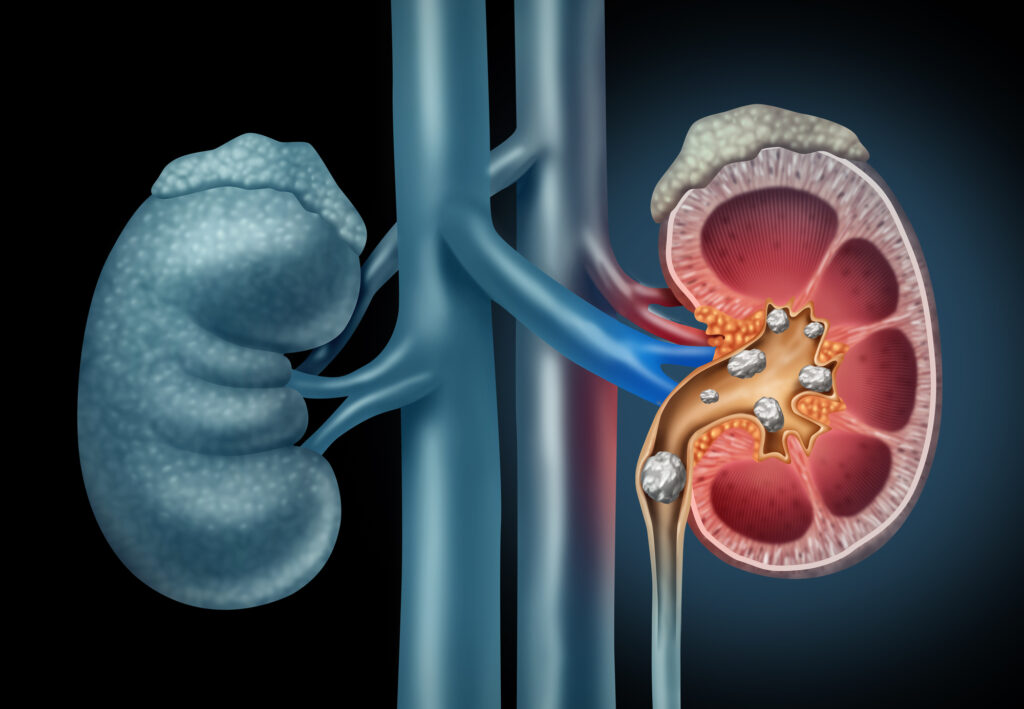Kidney stones affect about one in every 11 people in the United States. Common symptoms include severe pain, nausea, vomiting, fever, chills, and bloody urine. But kidney stones don’t just impact quality of life. In the long run, they can lead to infections, hydronephrosis (swollen kidneys), renal insufficiency, and end-stage renal disease. Known risk factors for developing kidney stones include obesity, dehydration, inflammatory bowel disease (IBS), diabetes, and gout.
Now, a study published in Frontiers in Nutrition has shown that an elevated intake of added sugars from processed foods and sodas should be added to that list. “Ours is the first study to report an association between added sugar consumption and kidney stones,” says lead author Dr. Shan Yin, a researcher at the Affiliated Hospital of North Sichuan Medical College in Nanchong, China.
The Study
Yin’s team analyzed epidemiological data from 28,303 adult women and men that was collected as part of the U.S. National Health and Nutrition Examination Survey (NHANES) from 2007 to 2018. Participants self-reported whether they had a history of kidney stones, and each participant’s daily intake of added sugars was estimated from information they provided about their most recent meals and snacks. For example, participants were asked if they had eaten syrups, honey, dextrose, fructose, or pure sugar during the past 24 hours. The participants were all surveyed twice: once in a face-to-face interview, and again in a telephone interview between three and 10 days later.
Each participant also received a healthy eating index score (HEI-2015) that summarized their diet in terms of healthy components such as fruits, vegetables, and whole grains, and potentially harmful foods such as refined grains, sodium, and saturated fats.
At the start of the study, participants with a higher intake of added sugar tended to have a higher current prevalence of kidney stones, a lower HEI score, and a lower education level. The overall mean intake of added sugars was 272.1 calories per day, which corresponds to 13.2% of total daily energy intake.
The researchers showed that after adjusting for other factors including gender, age, ethnicity, relative income, BMI, HEI-2015 score, smoking status, and history of diabetes, the percentage of energy intake from added sugars was positively and consistently correlated with kidney stones. For example, participants whose intake of added sugars was among the 25% highest in the population had 39% greater odds of developing kidney stones over the course of the study.
Similarly, participants who derived more than 25% of their total energy from added sugars had 88% greater odds of developing kidney stones than those who derived less than 5% of their total energy from added sugars.
Conclusions
The researchers point out that it is not yet known exactly how consuming more added sugars contributes to the development of kidney stones. Because this was an uncontrolled observational trial, there could be unknown confounding factors driving this association.
“Further studies are needed to explore the association between added sugar and various diseases or pathological conditions in detail,” says Yin. “For example, what types of kidney stones are most associated with added sugar intake?”
That said, Yin concludes that the study offers an immediate practical benefit. “It suggests that limiting added sugar intake may help to prevent the formation of kidney stones.”






